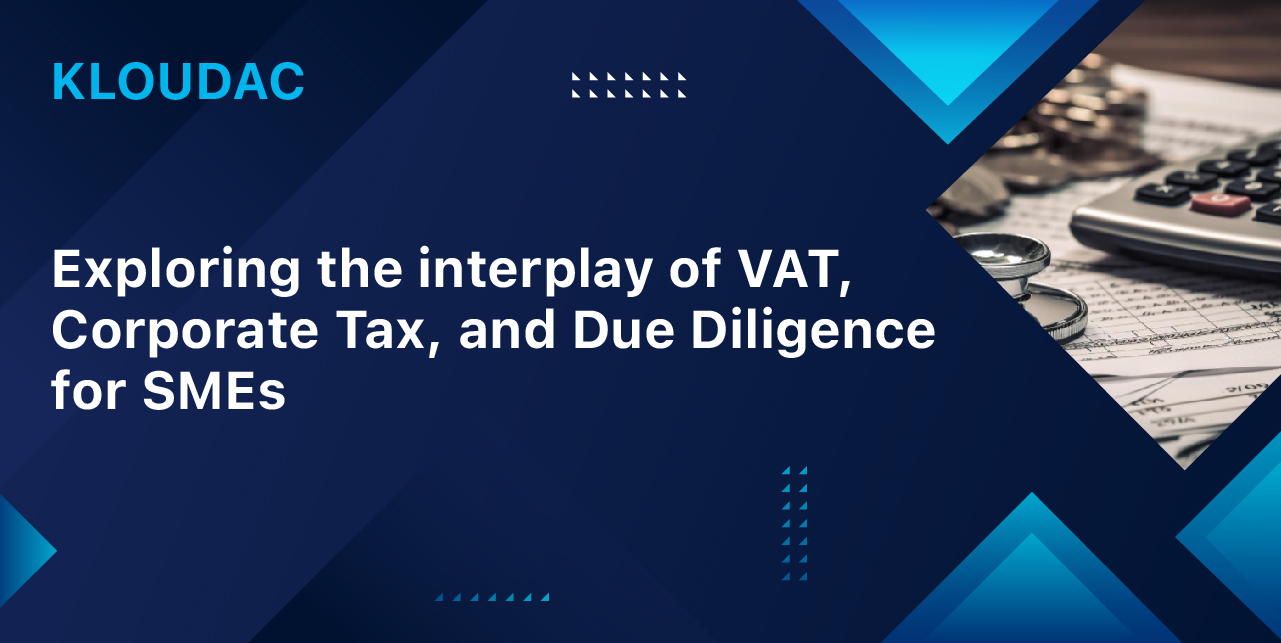In the intricate world of business, SMEs (Small and Medium-sized Enterprises) often find themselves treading a fine line between profitability and regulatory compliance. The interplay of Value Added Tax (VAT), Corporate Tax, and Due Diligence stands out as a dance that SMEs must master. Let’s discover how these three elements coalesce, impacting the fiscal health and sustainability of small and medium-sized businesses.
Unraveling VAT
Value Added Tax, the silent revenue generator, often plays a pivotal role in the financial landscape of SMEs. As these businesses engage in transactions, the VAT obligations become a crucial factor influencing pricing, profit margins, and overall competitiveness. Navigating the complexities of VAT requires a keen understanding of exemptions, thresholds, and the ever-changing regulatory environment.
For SMEs, maintaining meticulous records is not just a bureaucratic formality but a strategic necessity. Accurate VAT reporting ensures compliance and provides an opportunity to optimize cash flow and make informed financial decisions. As SMEs explore global markets, the challenge intensifies, demanding a thorough grasp of international VAT regulations.
The Corporate Tax
Corporate tax, the grand choreographer of a company’s fiscal performance, orchestrates the financial symphony of SMEs. Understanding the nuances of tax planning, deductions, and incentives becomes paramount for these enterprises striving to maximize profits while meeting their societal obligations.
Strategic tax planning is not a luxury but a necessity for SMEs aiming to thrive in a competitive landscape. From choosing an optimal corporate structure to leveraging tax credits, SMEs must navigate the intricate steps of the corporate tax ballet. Embracing digital tools and seeking professional advice can transform this complex choreography into a well-coordinated dance that propels SMEs toward financial success.
Due Diligence
The due diligence waltz is an indispensable part of the SME journey, especially in an era of increasing regulatory scrutiny. From mergers and acquisitions to partnerships and investments, due diligence serves as the compass guiding businesses through the maze of legal and financial risks.
SMEs must approach due diligence with a meticulous mindset, recognizing its role in protecting the company’s interests and reputation. Whether preparing for an audit or evaluating a potential business partner, due diligence becomes the rhythm SMEs must master to maintain financial harmony.
Importance of these factors for a company/ business
- Value Added Tax (VAT), Corporate Tax, and Due Diligence. VAT, a consumption tax levied throughout production and distribution, is thoroughly examined, focusing on its implications for pricing, sales, and overall financial planning. Businesses are equipped with insights into VAT registration, compliance necessities, and strategies for optimizing VAT-related processes, supported by real-world examples.
- The Corporate Tax section delves into the essential understanding needed for financial health and compliance, covering tax planning, deductions, credits, and international tax implications. Through case studies, businesses gain valuable insights into effective strategies for minimizing tax liabilities while meeting legal requirements and facilitating sustainable growth.
- The guide places a spotlight on Due Diligence as a critical aspect of corporate decision-making, providing a comprehensive exploration of its processes in mergers, acquisitions, partnerships, or investments. Emphasizing the role of due diligence in risk mitigation and informed decision-making, it offers practical tips for thorough financial, legal, and operational assessments, supported by case studies illustrating its crucial role in identifying potential pitfalls and ensuring successful business transactions. This resource empowers businesses to confidently navigate these intricacies and make informed decisions for financial success.
KLOUDAC Accounting Firm Dubai, UAE
In the ever-evolving world of business, SMEs find themselves engaged in a delicate dance with VAT, Corporate Tax, and Due Diligence. As these elements intertwine, mastering the choreography becomes imperative for the fiscal well-being and long-term sustainability of small and medium-sized enterprises. By staying informed, embracing technological innovations, and seeking professional guidance, SMEs can transform this intricate dance into a performance that resonates with financial success and resilience. KLOUDAC consultation helps you to stay informed and move with modern technology.
